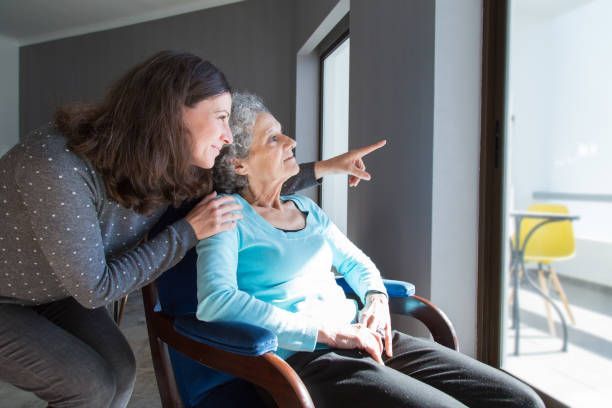
Providing the Same Level
of Care We Expect for
Our Own Family
(516) 408-0034
Alzheimer’s vs. Dementia: Key Differences, Symptoms & Care Tips
Alzheimer's vs. Dementia: Key Differences, Symptoms & Care Tips
7 Day Home Care provides exceptional Alzheimer’s and dementia care with a team of highly trained and experienced home health aides who specialize in supporting individuals with cognitive impairments. Our caregivers are not only certified but also receive ongoing training to ensure they can handle the unique challenges of memory care with patience, compassion, and expertise. Every home health aide works under the direct supervision of our registered nursing staff, ensuring that each client receives personalized, high-quality care tailored to their evolving needs. Whether assisting with daily activities, managing behavioral changes, or creating a safe and structured environment, 7 Day Home Care is committed to enhancing the quality of life for those living with Alzheimer’s and dementia.
If you are searching for Alzheimer's or dementia in home care near you, please contact
7 Day Home Care
today at 516-408-0034 to learn more.

Understanding the Difference Between Alzheimer’s Disease and Dementia
Understanding the difference between Alzheimer’s disease and dementia is crucial for caregivers, families, and those affected. While these terms are often used interchangeably, they represent distinct conditions. This guide explores their key differences, symptoms, risk factors, and the best care strategies available in 2025.
What Is Dementia?
Dementia is a broad term for a decline in cognitive function severe enough to interfere with daily life. It is not a single disease but rather an umbrella term that includes various conditions affecting memory, reasoning, and behavior. The most common types of dementia include:
• Alzheimer’s disease (accounts for 60-80% of cases)
• Vascular dementia (caused by reduced blood flow to the brain)
• Lewy body dementia (linked to abnormal protein deposits in the brain)
• Frontotemporal dementia (affects the brain’s frontal and temporal lobes)
Common Symptoms of Dementia:
• Memory loss and difficulty recalling recent events
• Trouble with language and communication
• Impaired judgment and decision-making
• Mood swings and behavioral changes
What Is Alzheimer’s Disease?
Alzheimer’s disease is a progressive neurodegenerative disorder and the most common cause of dementia. It develops due to abnormal protein deposits—amyloid plaques and tau tangles—that disrupt communication between brain cells, leading to cognitive decline.
Key Symptoms of Alzheimer’s Disease:
• Memory loss: Forgetting names, recent conversations, or important dates
• Cognitive decline: Difficulty thinking, reasoning, and solving problems
• Behavioral changes: Mood swings, confusion, and trouble completing familiar tasks
Alzheimer’s Disease vs. Dementia: Key Differences
While Alzheimer’s disease is a type of dementia, not all dementia cases are Alzheimer’s. Dementia is an overarching term that includes multiple cognitive disorders, whereas Alzheimer’s is a specific disease with a distinct progression.
Early Symptoms to Watch For:
Dementia Symptoms:
Difficulty remembering recent events
Trouble finding the right words
Impaired problem-solving skills
Alzheimer’s-Specific Symptoms:
Forgetting names and conversations frequently
Misplacing items in unusual places
Struggling with familiar activities like cooking or driving
Recognizing these early warning signs is critical for timely diagnosis and treatment.
Risk Factors for Dementia and Alzheimer’s
Several factors contribute to the risk of developing dementia or Alzheimer’s disease:
1. Age: Risk increases significantly after 65.
2. Genetics: A family history of dementia raises the likelihood.
3. Lifestyle: Poor diet, lack of exercise, and smoking contribute to cognitive decline.
4. Chronic Conditions: Hypertension, diabetes, and heart disease elevate risk.
How Alzheimer’s Disease and Dementia Are Diagnosed
An accurate diagnosis involves multiple steps:
Medical history review: Family history and symptom analysis
Cognitive and neurological exams: Assessing memory, language, and thinking skills
Brain imaging: MRI or CT scans to detect changes in brain structure
Blood tests: Identifying underlying health issues such as vitamin deficiencies
Early diagnosis allows for better planning, access to treatment, and improved quality of life.
Best Care Tips for Dementia and Alzheimer’s Patients
Caring for someone with dementia or Alzheimer’s requires patience, planning, and the right support. Follow these expert-backed strategies:
1. Create a Safe Home Environment
• Remove tripping hazards like loose rugs.
• Install grab bars in bathrooms and hallways.
• Lock cabinets with cleaning products and medications.
2. Establish a Predictable Routine
• Consistency reduces confusion and anxiety.
• Set fixed times for meals, medications, and activities.
3. Encourage Physical and Mental Activity
• Walking, stretching, or light exercise slows cognitive decline.
• Puzzles, reading, and memory games keep the mind active.
4. Provide Emotional and Social Support
• Be patient and understanding during mood swings.
• Encourage social interaction to prevent isolation.
5. Use Technology for Assistance
• Medication reminder apps help with daily schedules.
• GPS tracking devices ensure safety for those prone to wandering.
6. Seek Professional Help When Needed
• Home care services provide specialized support.
• Support groups offer emotional relief for caregivers.
New Treatments and Research in 2025
While there is no cure for Alzheimer’s or dementia yet, ongoing advancements are promising:
Medications: New drugs target amyloid plaques to slow progression.
Dietary Interventions: The Mediterranean diet has been linked to brain health benefits.
AI Technology: Early detection tools and personalized care plans improve patient outcomes.
Making Informed Care Decisions Today
Understanding the differences between Alzheimer’s disease and dementia is essential for effective caregiving. By recognizing early symptoms, seeking timely medical evaluations, and implementing best care practices, families can ensure a better quality of life for their loved ones.
If you or a family member need expert dementia or Alzheimer’s care, reach out to 7 Day Home Care for personalized, compassionate support. 7 Day Home Care provides in-home care services in Manhattan, Queens, Brooklyn, Nassau County, and Suffolk County, New York. To learn more about our home care services, please call 516-408-0034.
Brian Callahan
7 Day Home Care










Hours of Operation
We are Open 24 Hours a Day
7 Days a Week
All Rights Reserved | 7 Day Home Care | Created by DAR Web Consulting